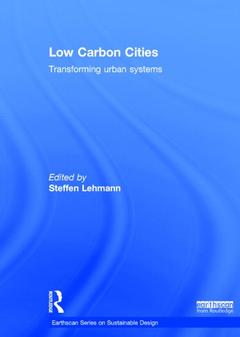Description
Low Carbon Cities
Transforming Urban Systems
Earthscan Series on Sustainable Design Series
Coordinator: Lehmann Steffen
Language: English
Subject for Low Carbon Cities:
Keywords
Urban Heat Island; Low Carbon Cities; low carbon; Urban Heat Island Effect; zero carbon; Vice Versa; heat islands; Water Sensitive Urban Design; urban design; Anthropogenic Heat; sustainable cities; Urban Greenery; green urbanism; Biophilic Cities; urban microclimate; smart cities; Green Roofs; steffen lehmann; UN; Denser; Urban Microclimates; GnPR; UHI Mitigation; Vertical Greenery; Part III; Urban Air Temperatures; Urban Climatic Map; Urban Climate; SVF; Extreme Heat Event; Energy Balance; Green Walls
Publication date: 09-2014
Support: Print on demand
Publication date: 09-2014
Support: Print on demand
Description
/li>Contents
/li>Readership
/li>Biography
/li>
Low Carbon Cities is a book for practitioners, students and scholars in architecture, urban planning and design. It features essays on ecologically sustainable cities by leading exponents of urban sustainability, case studies of the new directions low carbon cities might take and investigations of how we can mitigate urban heat stress in our cities? microclimates. The book explores the underlying dimensions of how existing cities can be transformed into low carbon urban systems and describes the design of low carbon cities in theory and practice. It considers the connections between low carbon cities and sustainable design, social and individual values, public space, housing affordability, public transport and urban microclimates. Given the rapid urbanisation underway globally, and the need for all our cities to operate more sustainably, we need to think about how spatial planning and design can help transform urban systems to create low carbon cities, and this book provides key insights.
Foreword Preface Introduction: Low carbon cities – more than just buildings Part I: Classic texts on ecologically sustainable cities: conceptual evolutions and different schools of thought1. Ecopolis – the regenerative city 2. Much better than climate change adaptation 3. Imagining biophilic cities 4. Sustainable cities are solar responsive cities 5. Trends in low carbon transport and urban development in thirty-three cities, 1995 to 2005 6. How city dwellers affect their resource hinterland – a spatial impact study of Australian households Part II: New directions: designing for low carbon cities 7. Future ecological design as urbaneering: new positions on city-making without scale 8. A planning approach for the transformation to low carbon cities 9. Green districts and carbon engineering: increasing greenery, reducing heat island effects and generating energy 10. From green buildings to sustainable urban design: two case studies 11. Urban reclamation and regeneration in Seoul, South Korea 12. From sustainable to low carbon cities: is India’s urban transformation triggering a paradigm shift? Part III: Urban micro climates: mitigating urban heat stress 13. The urban heat island and low carbon cities 14. A holistic view of the effects of urban heat island mitigation 15. Urban micro climates: mitigating urban heat stress 16. Energy reduction using natural ventilation in city planning 17. The impact on the increase of urban air temperature on planning and building energy consumption in tropical urban climates 18. Urban heat islands: case studies from Frankfurt am Main, Arnhem and Ho-Chi-Minh City 19. The green plot ratio and the role of greenery in low carbon living 20. Urban populations' vulnerability to climate extremes: mitigating urban heat through technology and water-sensitive urban design 21. Multi-scale analysis of surface layer urban heat island effect in five higher density precincts of central Sydney 22. Looking ahead: Applying low carbon principles to shift urban design paradigms in the Asia-Pacific region towards green urbanism Glossary Bibliography Index
Steffen Lehmann is Founding Director of the Zero Waste Research Centre for Sustainable Design and Behaviour at the University of South Australia. He is a widely published author and scholar, and is Founding Director of the s_Lab Space Laboratory for Architectural Research and Design (Sydney–Berlin). A German-born architect and urban designer, he was editor-in-chief (2007–2014) of the US-based Journal of Green Building and an advisor to the Australian and German governments, city councils and industry. Since July 2014 he has been Head of School in the School of Built Environment at Curtin University, Perth.




